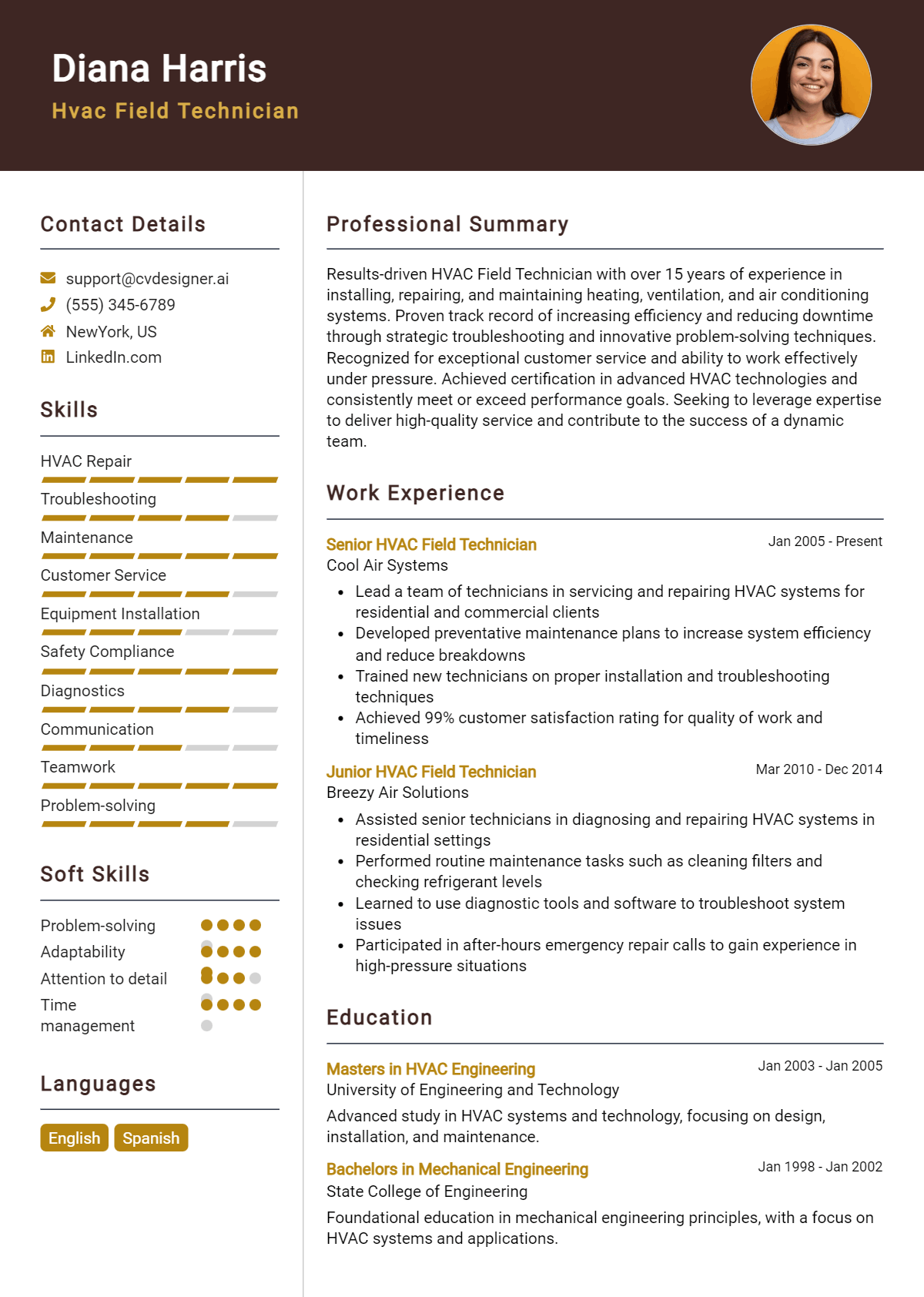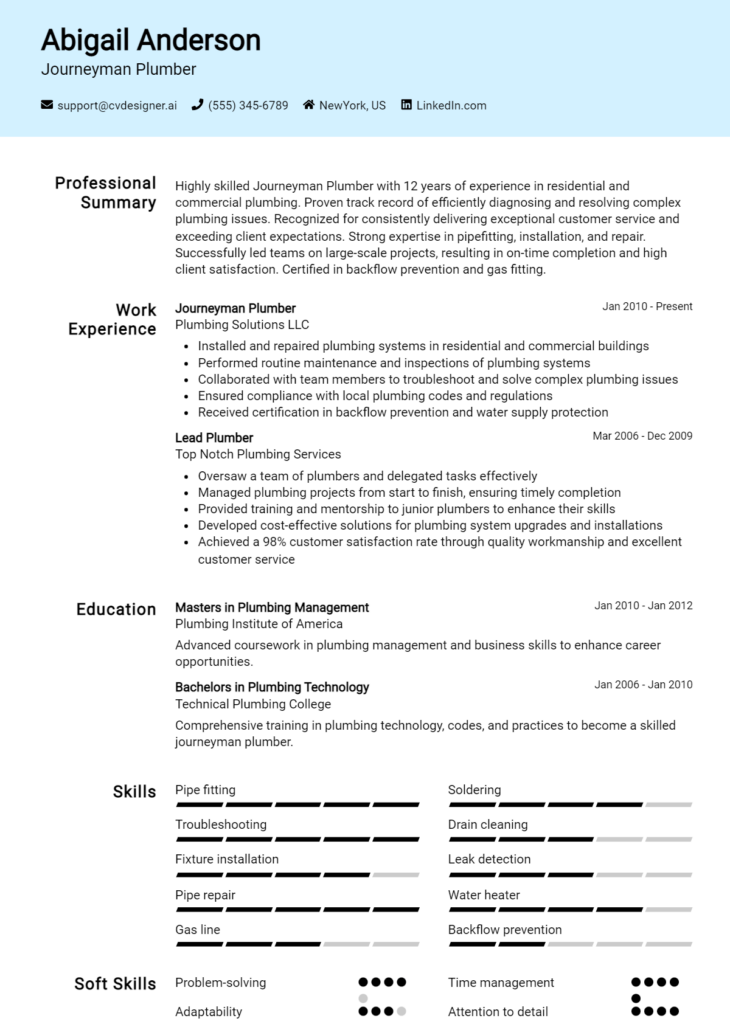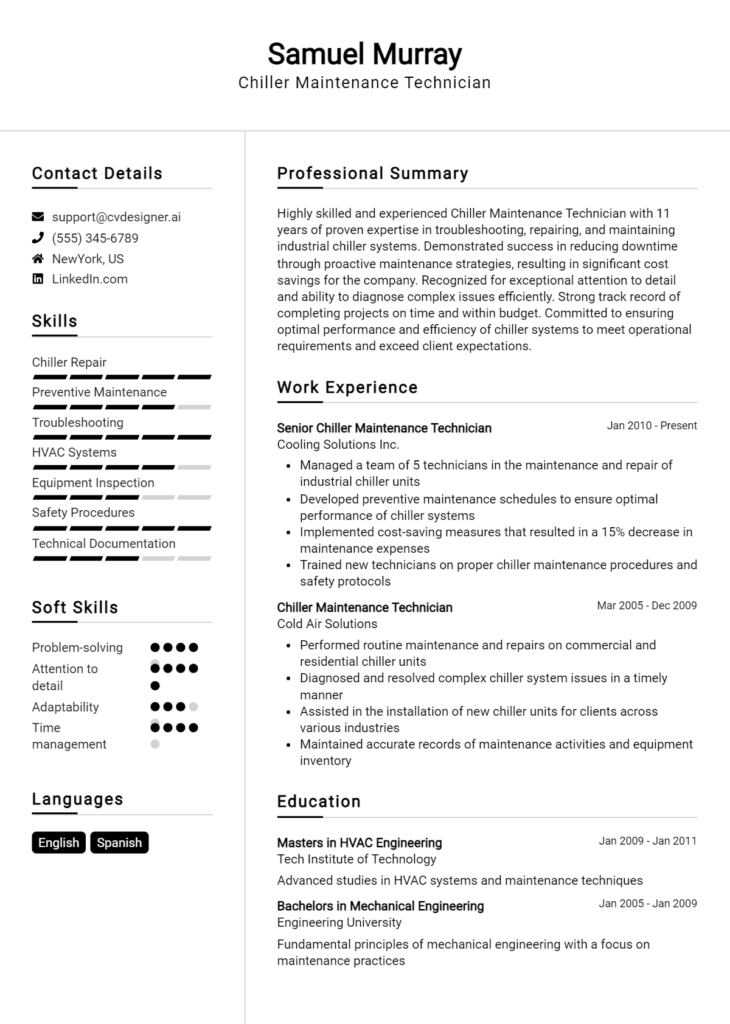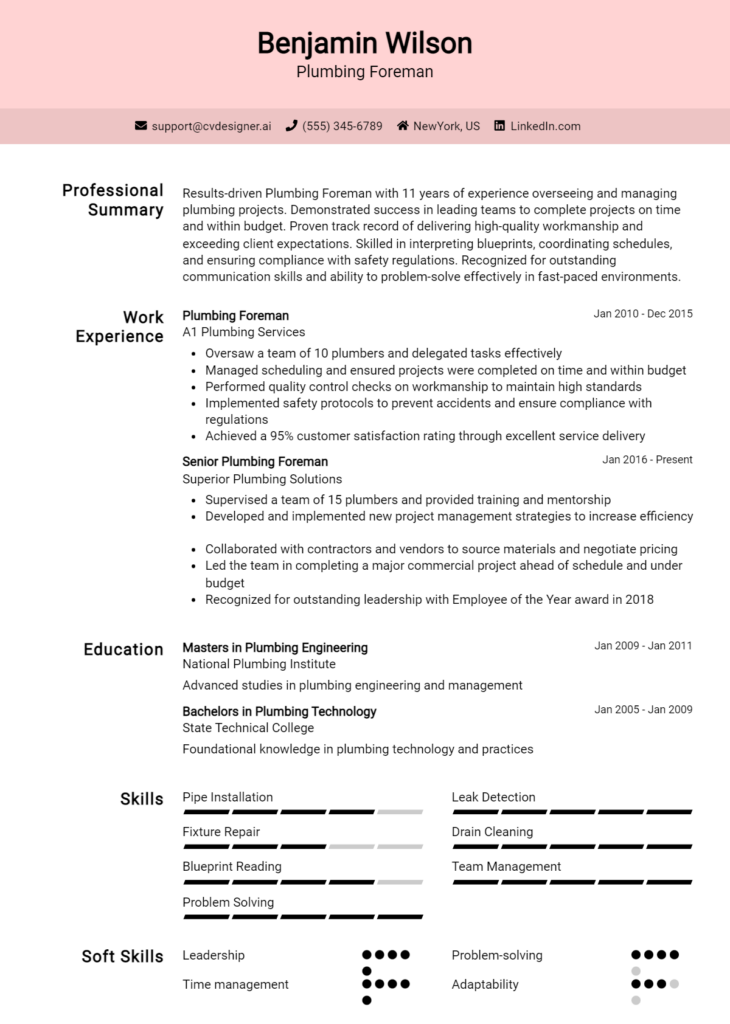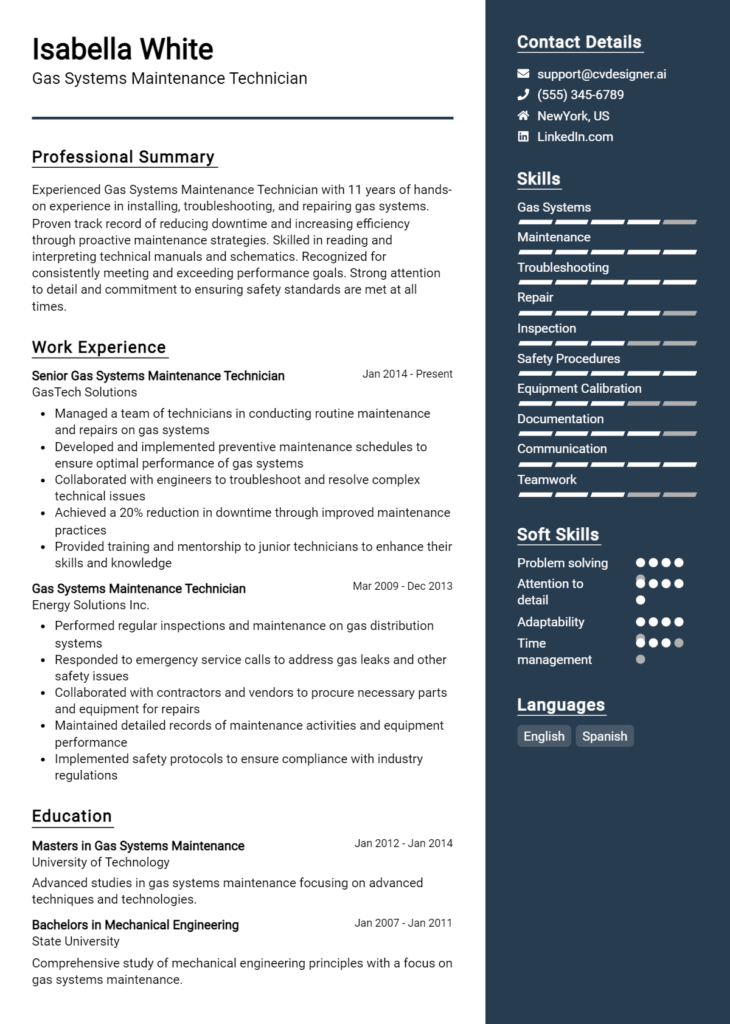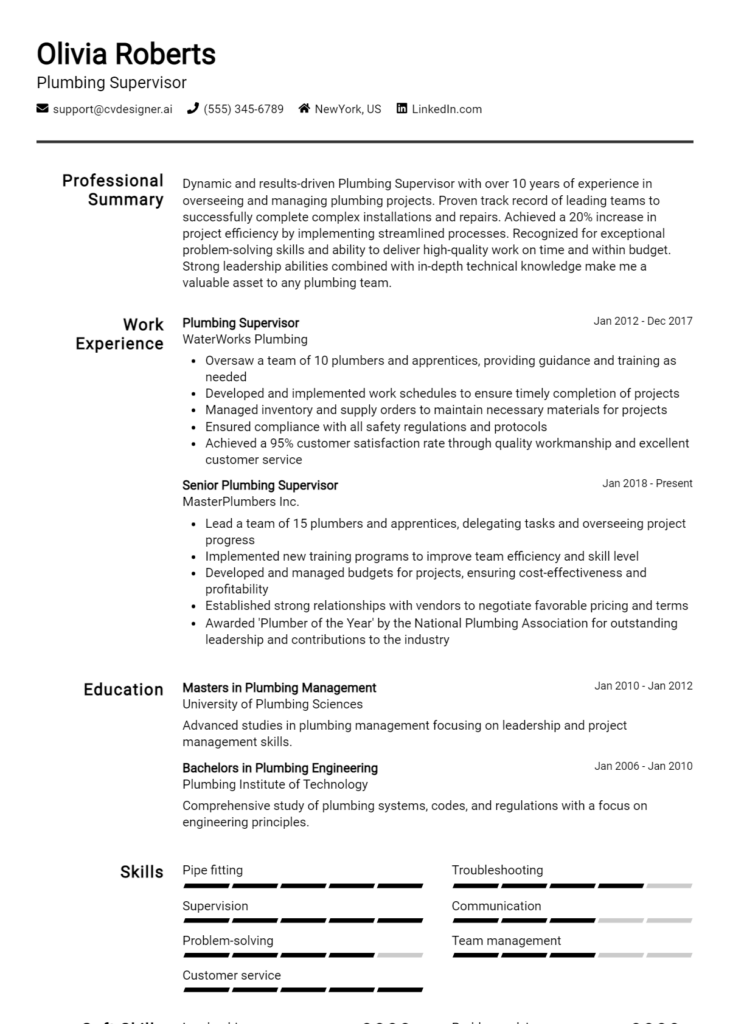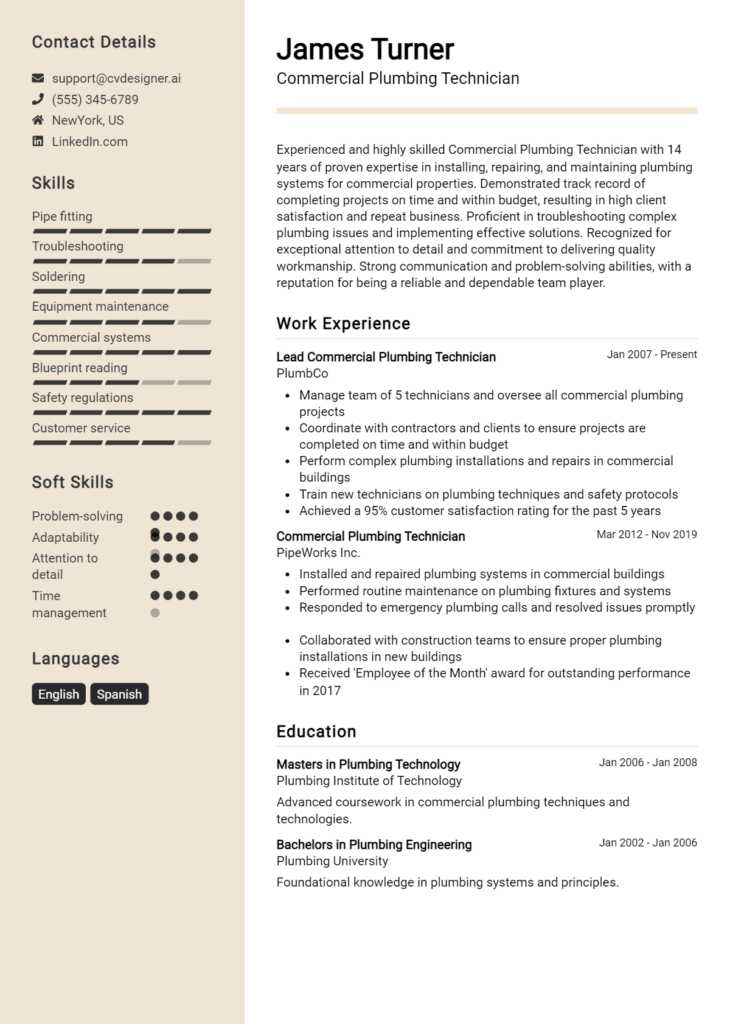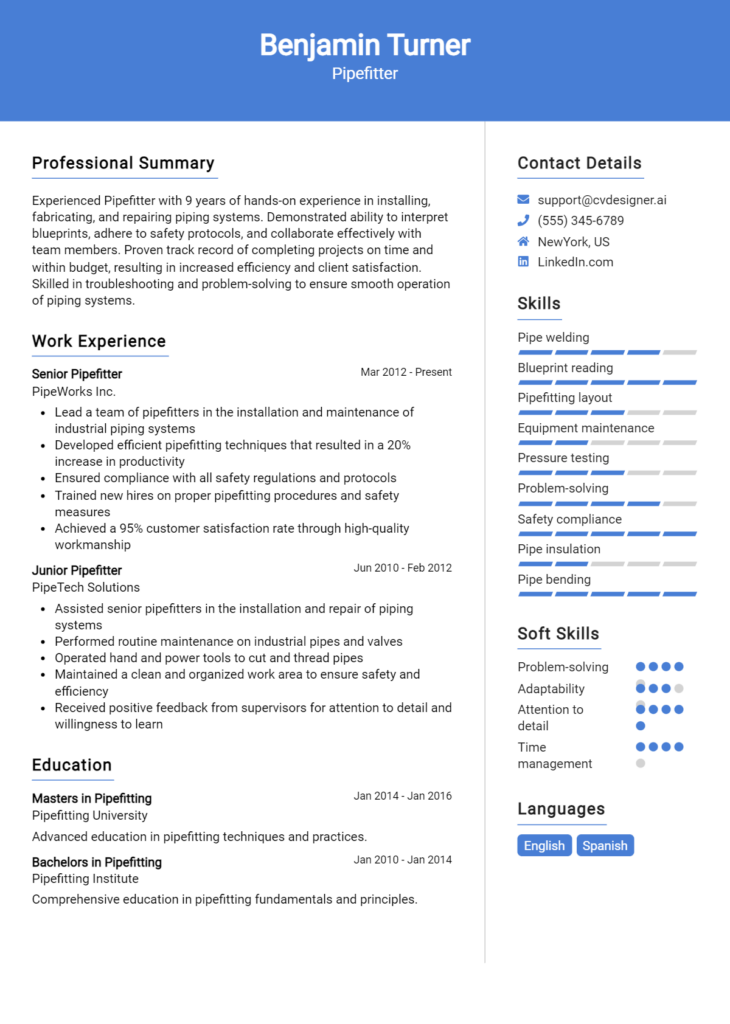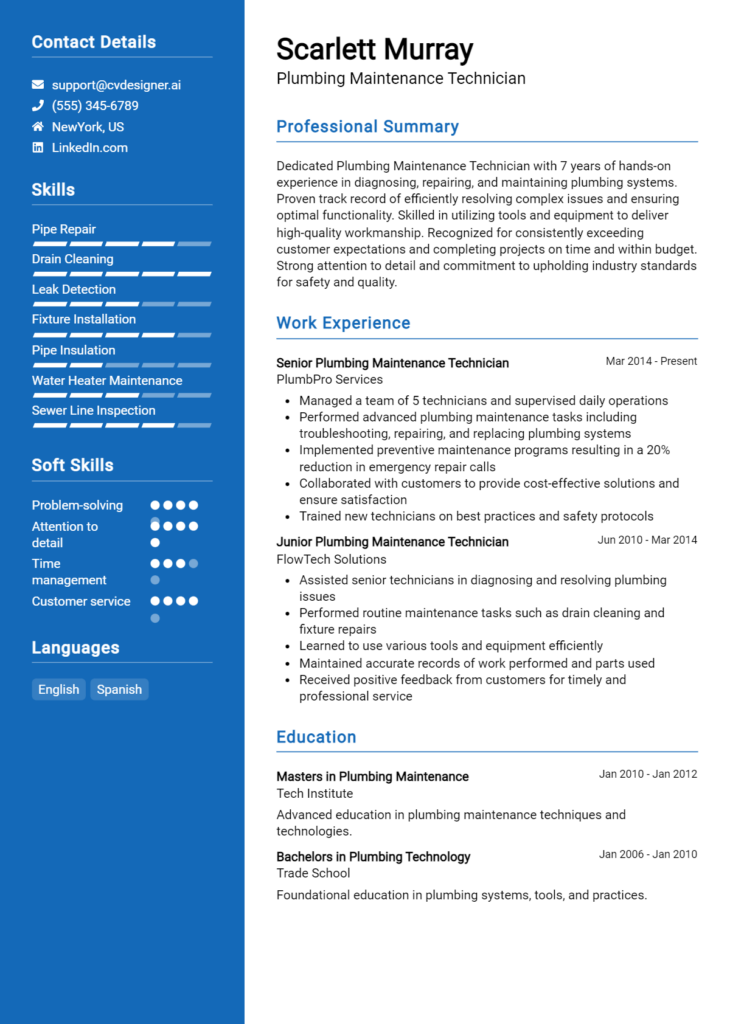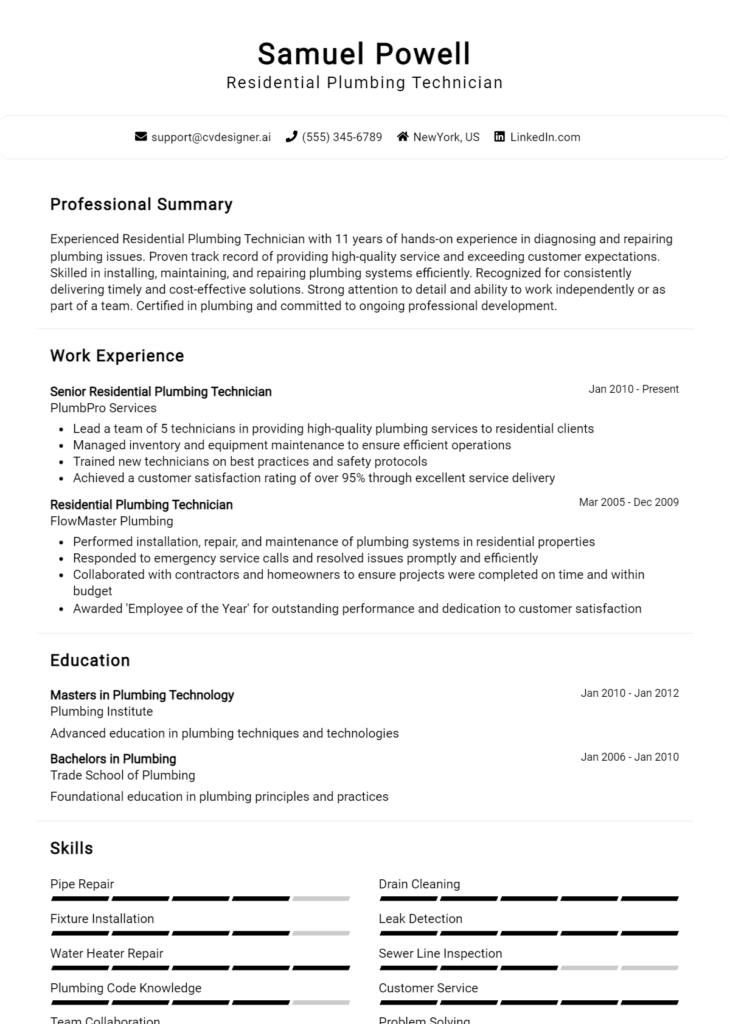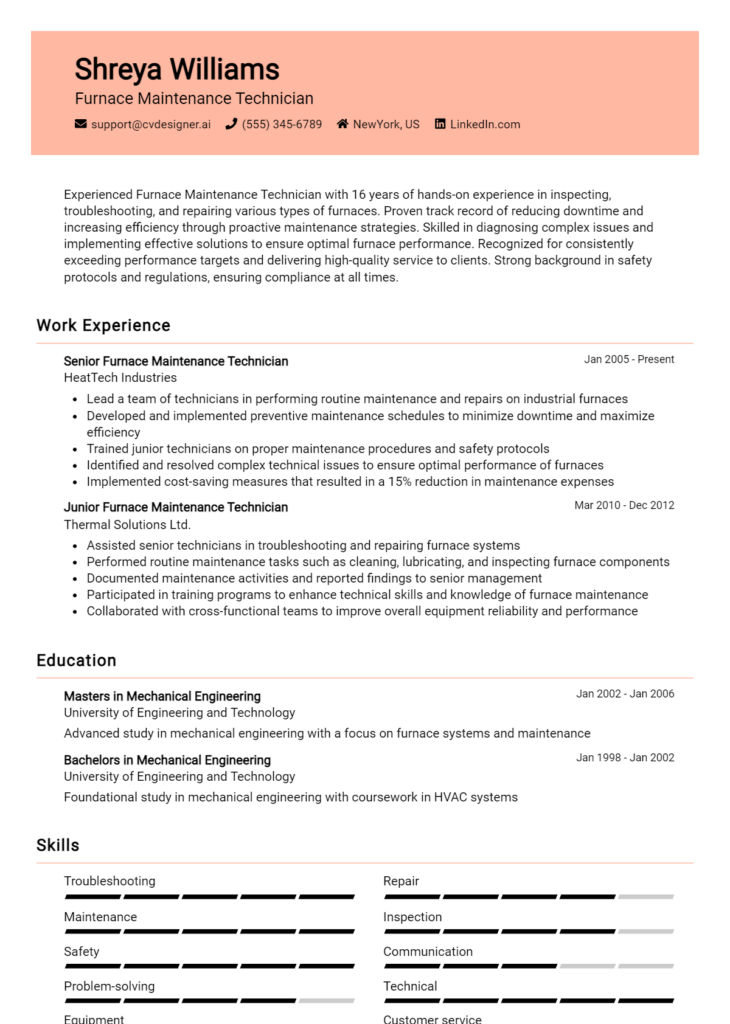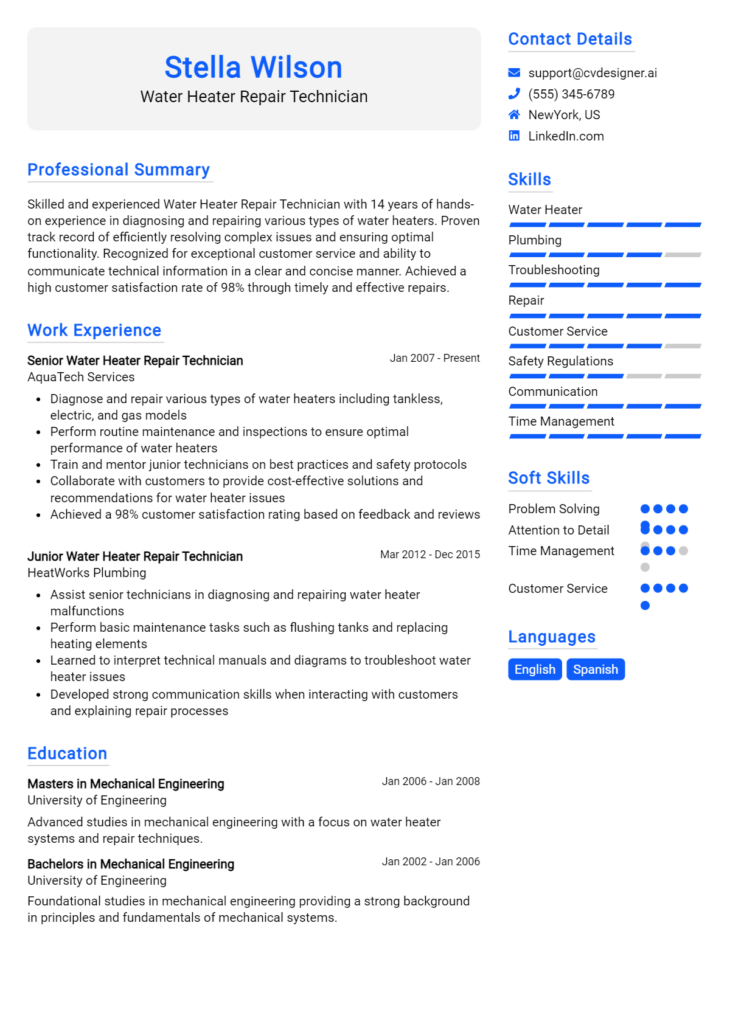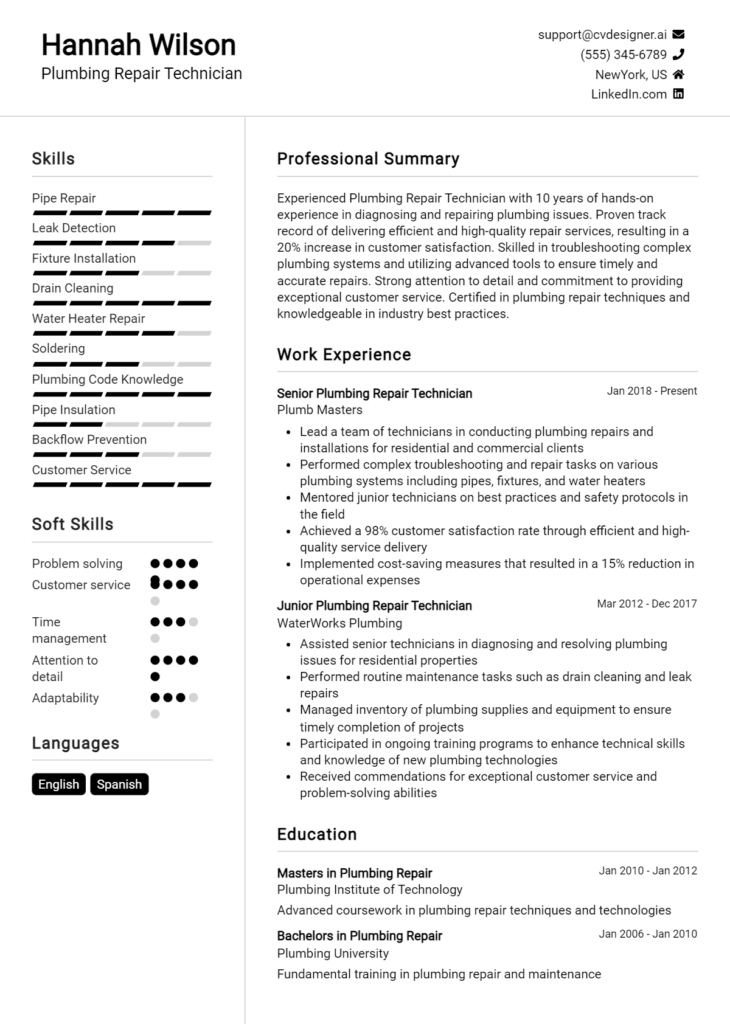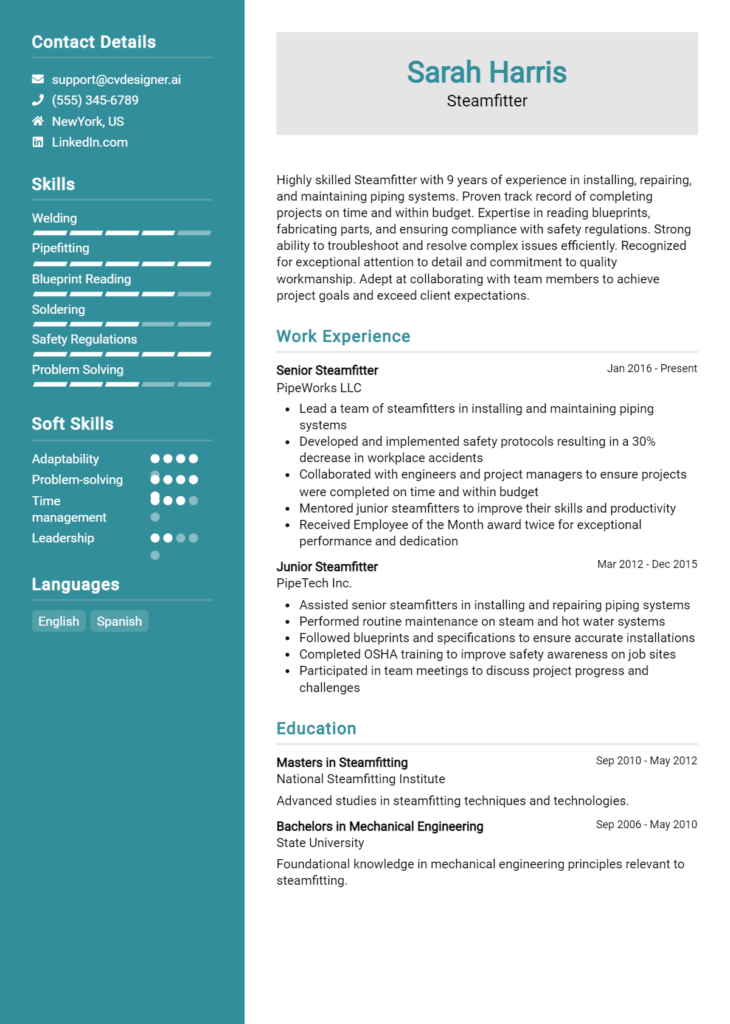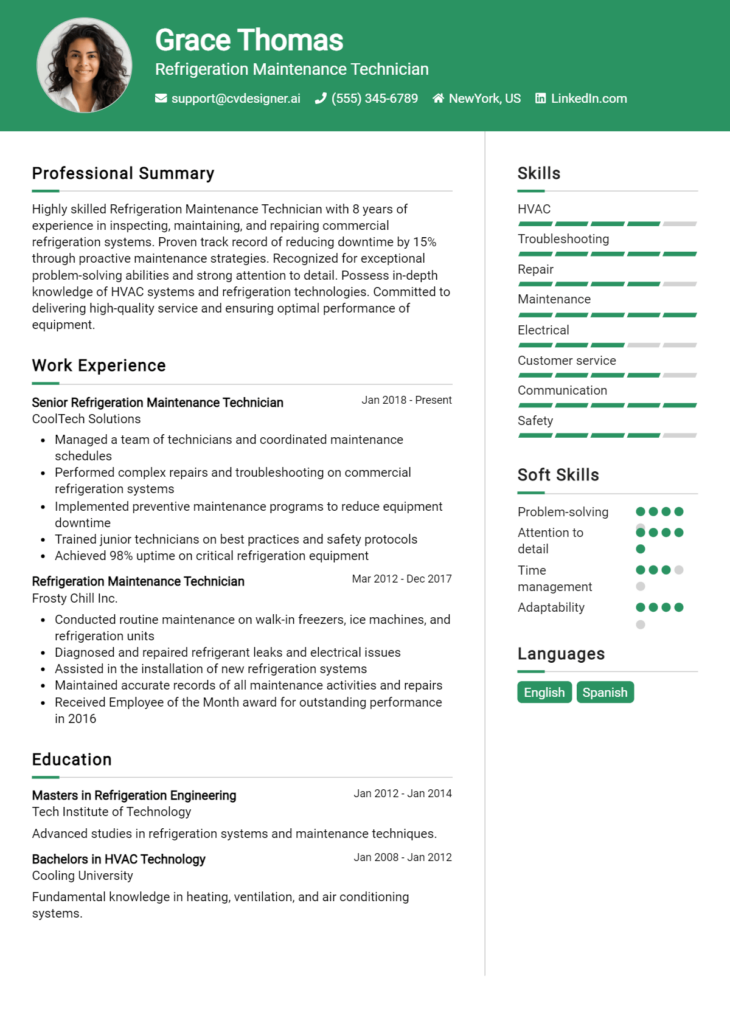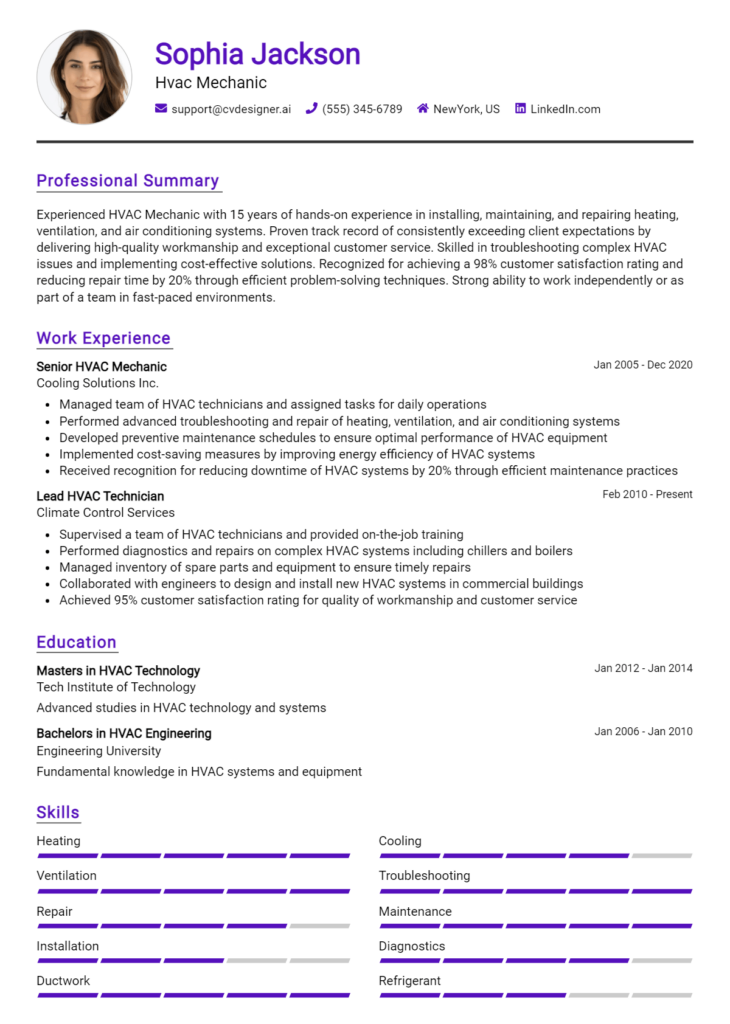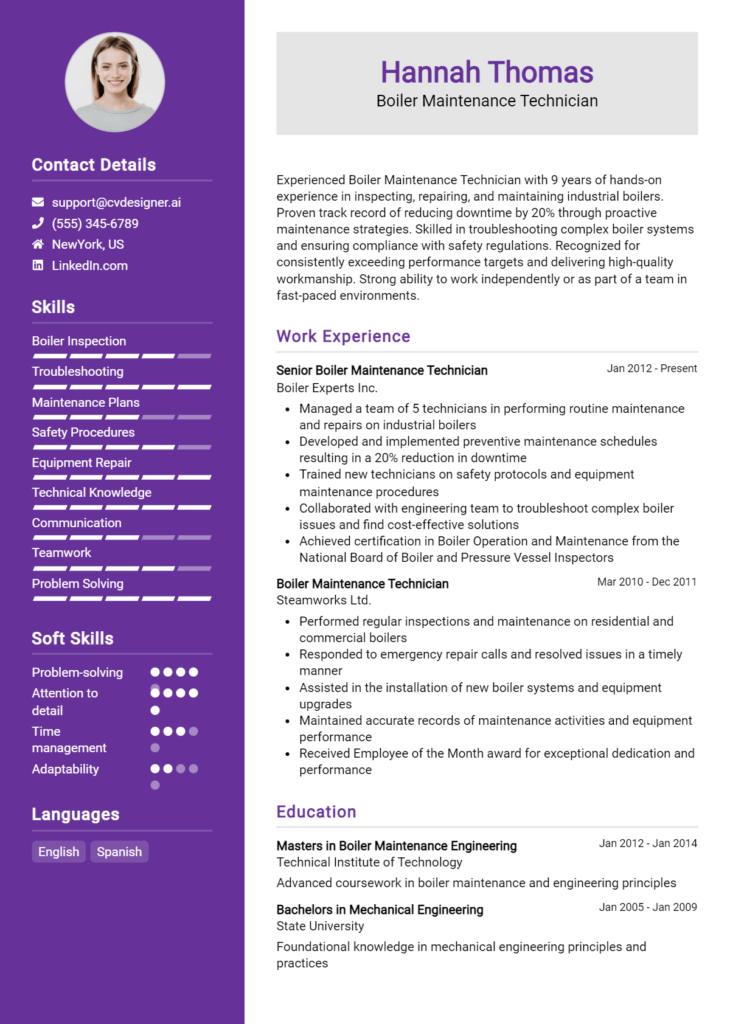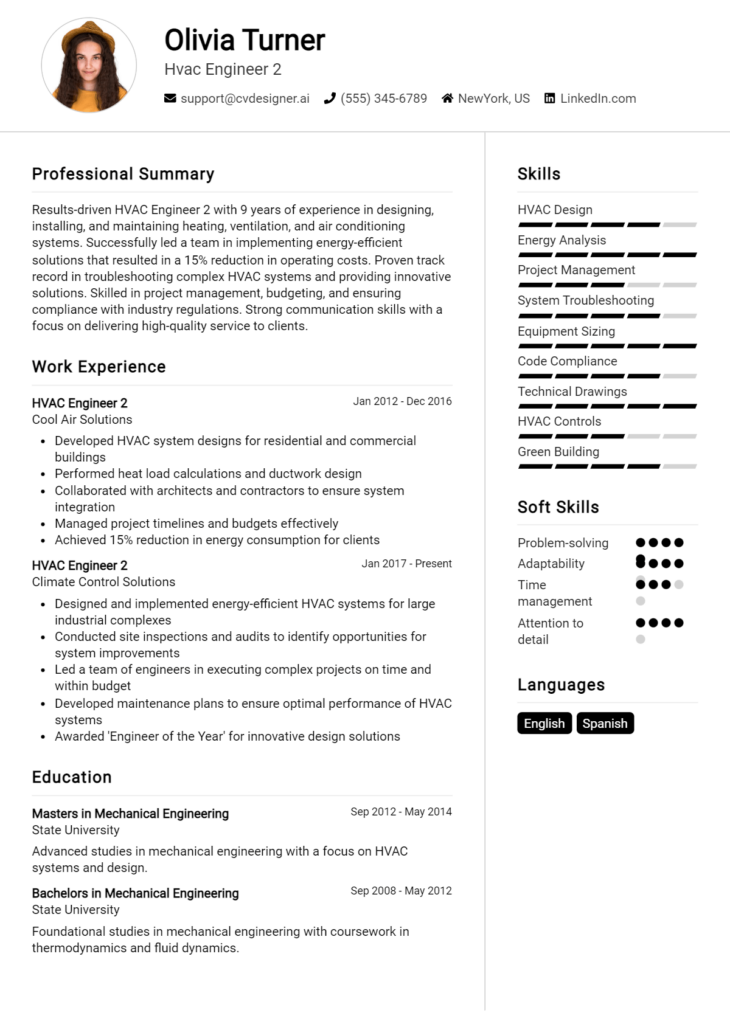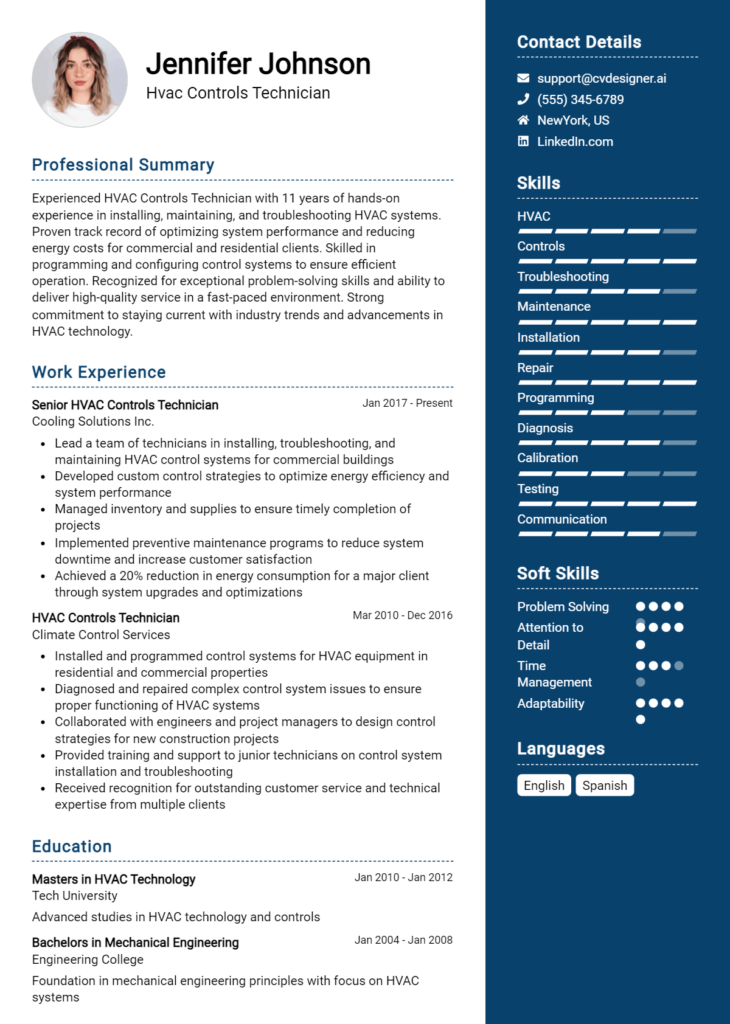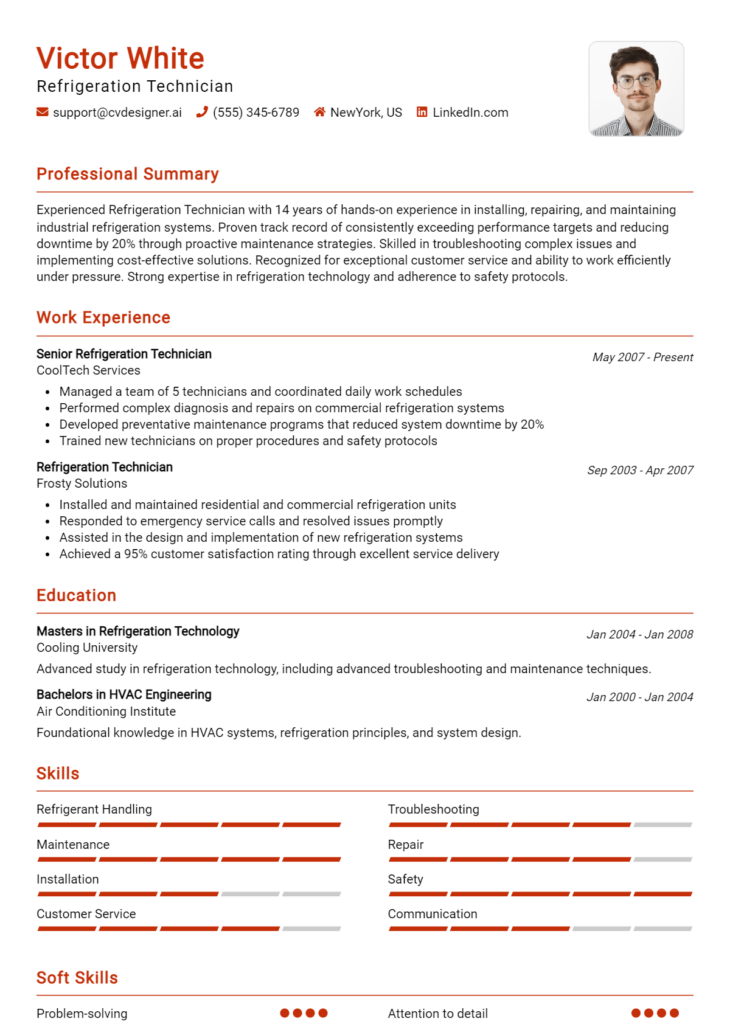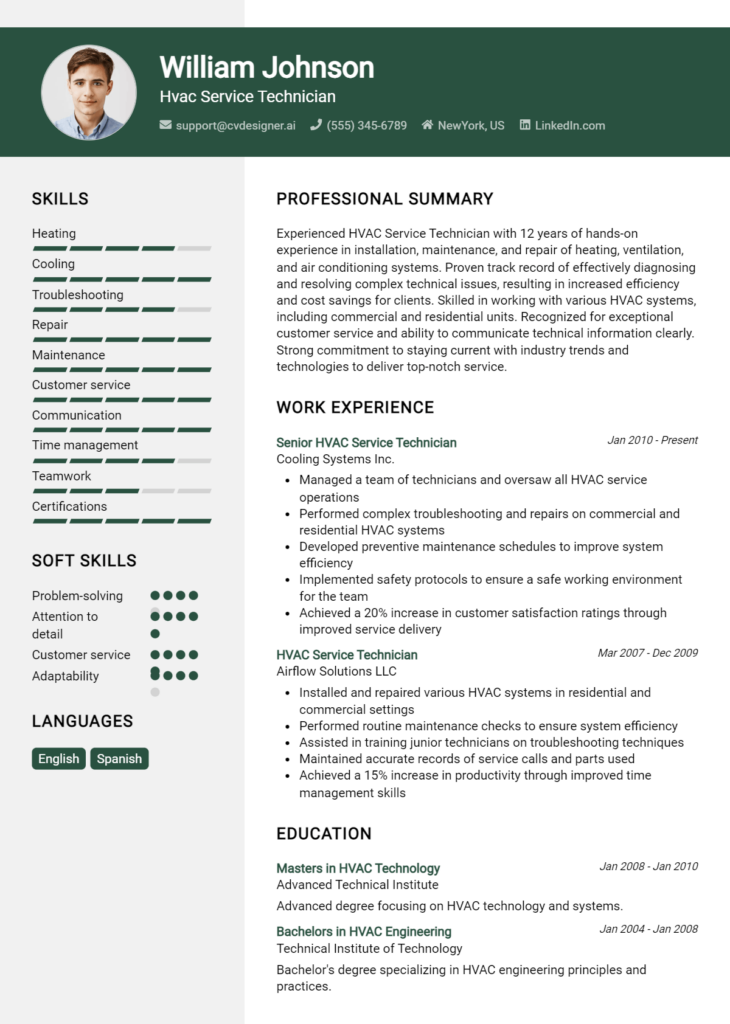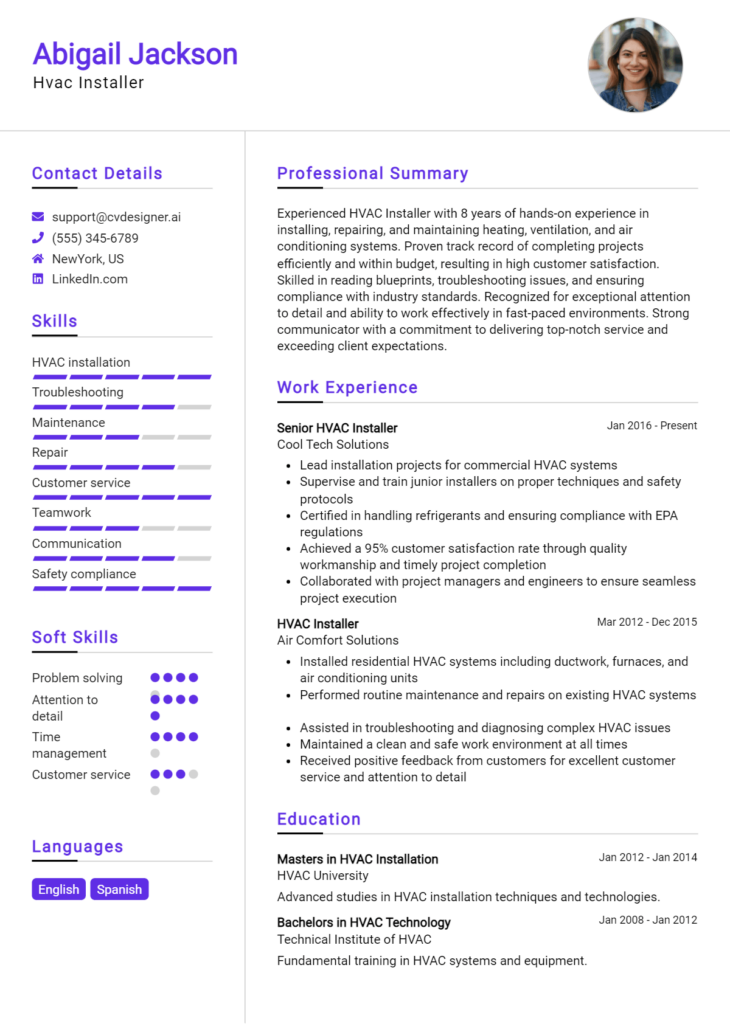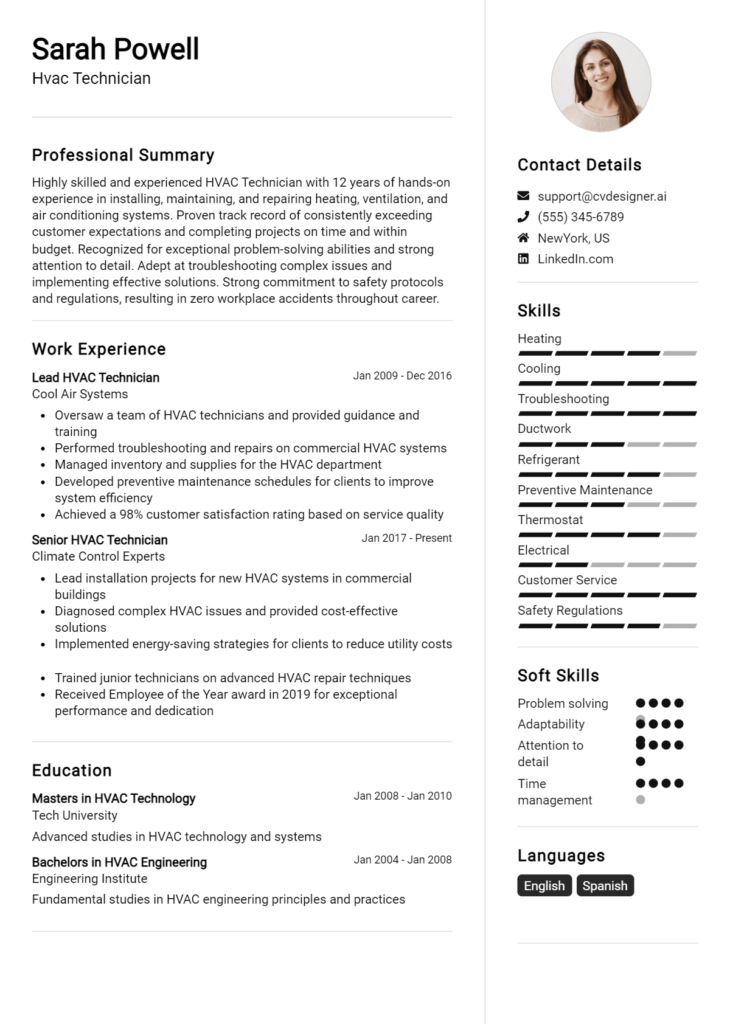HVAC Field Technician Core Responsibilities
An HVAC Field Technician plays a vital role in maintaining and optimizing heating, ventilation, and air conditioning systems. Key responsibilities include installing, repairing, and performing preventive maintenance on HVAC equipment. This role requires technical expertise, operational knowledge, and strong problem-solving abilities to address complex system issues effectively. By collaborating with various departments, the technician ensures seamless operations that contribute to the organization's goals. A well-structured resume can effectively showcase these essential skills and experiences, enhancing career prospects.
Common Responsibilities Listed on HVAC Field Technician Resume
- Install and maintain HVAC systems in residential and commercial settings.
- Troubleshoot and repair heating, cooling, and ventilation systems.
- Conduct preventive maintenance to ensure optimal system performance.
- Read and interpret blueprints and technical diagrams.
- Perform system diagnostics using specialized tools and equipment.
- Maintain accurate records of service performed and parts used.
- Communicate with clients regarding service needs and recommendations.
- Comply with safety regulations and industry standards.
- Assist in the training of junior technicians and apprentices.
- Stay updated on the latest HVAC technologies and techniques.
- Provide exceptional customer service and support.
High-Level Resume Tips for HVAC Field Technician Professionals
In today’s competitive job market, a well-crafted resume is crucial for HVAC Field Technician professionals aiming to make a strong first impression. Your resume is often the initial point of contact with a potential employer, acting as a vital marketing tool that showcases your skills, experience, and achievements. A compelling resume not only highlights your technical abilities but also demonstrates your value as a candidate who can contribute to the success of an organization. This guide will provide practical and actionable resume tips specifically tailored for HVAC Field Technician professionals, helping you create a document that stands out to hiring managers.
Top Resume Tips for HVAC Field Technician Professionals
- Tailor your resume to match the job description, emphasizing keywords and required skills listed by the employer.
- Showcase relevant experience by detailing specific HVAC projects you’ve worked on, including types of systems installed or serviced.
- Quantify your achievements by including metrics, such as the number of installations completed or percentage reductions in energy consumption.
- Highlight industry-specific skills, such as knowledge of HVAC systems, troubleshooting abilities, and proficiency with relevant tools and technologies.
- Include certifications and licenses, such as EPA certification or NATE certification, to establish your credentials and expertise.
- Use action-oriented language to describe your responsibilities, emphasizing your role in problem-solving and project management.
- Consider adding a summary statement at the top of your resume that encapsulates your experience and key strengths in the HVAC field.
- Keep the layout clean and organized, using easy-to-read fonts and consistent formatting to enhance readability.
- Incorporate any relevant continuing education or training to show your commitment to professional development in the HVAC industry.
By implementing these tips, HVAC Field Technician professionals can significantly enhance their resumes, increasing their chances of landing interviews and ultimately securing a position in this vital field. A polished resume not only reflects your qualifications but also conveys your dedication and professionalism to prospective employers.
Why Resume Headlines & Titles are Important for HVAC Field Technician
In the competitive field of HVAC (Heating, Ventilation, and Air Conditioning), a well-crafted resume is essential to stand out among numerous applicants. The resume headline or title serves as a crucial first impression, acting as a snapshot of a candidate’s qualifications and professional identity. A strong headline can immediately capture the attention of hiring managers, succinctly summarizing key skills and experiences relevant to the HVAC Field Technician role. It should be concise, relevant, and directly related to the job being applied for, ensuring that the candidate’s value is communicated quickly and effectively.
Best Practices for Crafting Resume Headlines for HVAC Field Technician
- Make it concise: Aim for a headline that is brief yet informative.
- Be role-specific: Tailor the headline to reflect the specific HVAC position you are applying for.
- Highlight key qualifications: Include your most relevant skills or certifications upfront.
- Use industry keywords: Incorporate terms that are commonly used in the HVAC field to enhance searchability.
- Showcase experience: Feature the number of years of relevant experience you possess.
- Indicate specialization: If applicable, mention any specific areas of expertise, such as residential or commercial systems.
- Maintain professionalism: Ensure the headline reflects a serious and professional tone appropriate for the industry.
- Avoid generic phrases: Steer clear of vague titles that do not convey specific information about your qualifications.
Example Resume Headlines for HVAC Field Technician
Strong Resume Headlines
Experienced HVAC Technician Specializing in Energy Efficiency Solutions
Certified HVAC Field Technician with 10+ Years in Commercial Installation
Detail-Oriented HVAC Technician with Expertise in Troubleshooting and Repair
Weak Resume Headlines
HVAC Technician Looking for a Job
Skilled Worker in HVAC
The strong headlines are effective because they provide specific information that highlights the candidate's expertise and experience, making them immediately appealing to hiring managers. They contain relevant keywords and convey a sense of professionalism and confidence. In contrast, the weak headlines fail to impress because they are vague and generic, lacking the necessary detail to effectively communicate the candidate's qualifications. This can lead to missed opportunities, as hiring managers may overlook candidates who do not present their skills in a compelling manner.
Writing an Exceptional HVAC Field Technician Resume Summary
A resume summary is a critical component for an HVAC Field Technician looking to make a strong impression on potential employers. This brief yet impactful section serves as the first point of contact with hiring managers, providing them with a snapshot of the candidate’s qualifications, skills, and relevant accomplishments. A well-crafted summary not only highlights key competencies in HVAC systems, troubleshooting, and maintenance but also showcases the technician's experience and successes in the field. By being concise and tailored to the specific job they are applying for, a strong resume summary can quickly capture attention and set the stage for the rest of the application.
Best Practices for Writing a HVAC Field Technician Resume Summary
- Quantify Achievements: Use numbers to highlight your accomplishments, such as the number of systems installed or the percentage of efficiency improvements.
- Focus on Relevant Skills: Emphasize technical skills that are pertinent to HVAC, such as system installation, repair, and troubleshooting.
- Tailor for the Job Description: Customize your summary to align with the specific requirements and responsibilities mentioned in the job posting.
- Be Concise: Aim for 2-4 sentences that clearly convey your qualifications without overwhelming the reader.
- Highlight Certifications: Mention any relevant certifications, such as EPA certification or NATE certification, to enhance credibility.
- Showcase Soft Skills: Include important soft skills like customer service, problem-solving, and teamwork, which are essential for field technicians.
- Use Action Verbs: Start sentences with strong action verbs to convey confidence and proactivity.
- Reflect Professional Growth: Mention years of experience and any advancements in your career to demonstrate your commitment to the trade.
Example HVAC Field Technician Resume Summaries
Strong Resume Summaries
Dedicated HVAC Field Technician with over 7 years of experience in installation, maintenance, and repair of HVAC systems. Successfully reduced system downtime by 30% through effective troubleshooting and preventive maintenance strategies.
Results-driven HVAC Technician with a proven track record of managing installations for over 200 residential units annually, achieving a 95% customer satisfaction rating through exceptional service and efficiency.
Experienced HVAC professional with expertise in both commercial and residential systems. Achieved 15% reduction in energy consumption for clients by implementing advanced system controls and regular maintenance checks.
Certified HVAC Technician with 10+ years of hands-on experience in diagnosing and repairing heating and cooling systems. Increased service response time by 40% through effective scheduling and prioritization of tasks.
Weak Resume Summaries
I am an HVAC technician with some experience in the field. I know how to fix systems and help customers.
Hardworking HVAC professional looking for a new opportunity. I have worked in various environments and can do many things.
The examples above illustrate the difference between strong and weak resume summaries. Strong summaries are specific, quantifiable, and directly relevant to the HVAC technician role, clearly demonstrating the candidate's skills and achievements. In contrast, weak summaries lack detail and are overly generic, failing to convey the candidate's qualifications or potential value to the employer.
Work Experience Section for HVAC Field Technician Resume
The work experience section of an HVAC Field Technician resume is crucial as it highlights the candidate's technical skills and demonstrates their capacity to manage teams and deliver high-quality products. This section serves as a platform to showcase relevant experiences that illustrate the applicant's proficiency in HVAC systems, troubleshooting capabilities, and adherence to industry standards. By quantifying achievements—such as successful project completions, cost savings, or improved efficiencies—candidates can effectively convey their value to potential employers. Aligning work experience with industry benchmarks not only enhances credibility but also positions the candidate as a competitive choice in the job market.
Best Practices for HVAC Field Technician Work Experience
- Detail specific HVAC systems and technologies you have experience with, such as refrigeration, heating, and air conditioning.
- Quantify achievements by including measurable results, such as reduced energy consumption or increased system efficiency.
- Highlight leadership roles and team collaboration, indicating your ability to work effectively with others on projects.
- Use action verbs to describe your responsibilities and accomplishments, making your contributions clear and impactful.
- Tailor your experience to align with the job description and industry standards, emphasizing relevant skills and achievements.
- Include certifications and training relevant to HVAC work, as these demonstrate ongoing professional development.
- Showcase problem-solving skills by highlighting specific challenges faced and how you addressed them successfully.
- Maintain a clear and concise format, ensuring your experience is easy to read and understand.
Example Work Experiences for HVAC Field Technician
Strong Experiences
- Led a team of 5 technicians to complete a large-scale HVAC installation project, finishing 2 weeks ahead of schedule and saving the company 15% in projected labor costs.
- Successfully diagnosed and repaired a complex refrigeration system, resulting in a 20% increase in energy efficiency and a reduction in energy bills for the client.
- Implemented a preventive maintenance program that reduced system downtime by 30%, significantly enhancing customer satisfaction and retention.
- Trained and mentored new technicians, improving team performance and reducing onboarding time by 25% through effective knowledge transfer.
Weak Experiences
- Performed HVAC repairs and maintenance tasks as needed.
- Assisted in installing HVAC systems without specifying the type or scale of the project.
- Worked with other technicians on various jobs, but did not detail any specific contributions or outcomes.
- Helped with troubleshooting issues, but did not mention any results or improvements achieved.
The examples listed as strong experiences effectively demonstrate quantifiable outcomes, technical leadership, and collaboration, making them compelling to potential employers. In contrast, the weak experiences lack specificity and measurable results, which diminishes their impact and fails to showcase the candidate's true capabilities and contributions in the HVAC field. By focusing on clear achievements and details, candidates can significantly enhance their resumes.
Education and Certifications Section for HVAC Field Technician Resume
The education and certifications section of an HVAC Field Technician resume is crucial as it highlights the candidate's academic background and demonstrates their commitment to the field through industry-relevant certifications. This section showcases not only formal education but also specialized training and continuous learning efforts that are vital in a rapidly evolving industry. By providing relevant coursework, certifications, and specialized training, candidates can enhance their credibility and demonstrate their alignment with job requirements, making them more appealing to potential employers.
Best Practices for HVAC Field Technician Education and Certifications
- Include only relevant degrees and certifications that pertain to HVAC systems and technologies.
- List certifications in order of relevance and importance to the job role.
- Provide specific details about coursework that directly applies to HVAC principles and practices.
- Highlight advanced certifications such as EPA 608, NATE, or HVAC Excellence.
- Include ongoing training or workshops that demonstrate a commitment to professional development.
- Utilize clear formatting to make information easy to read and understand.
- Keep the information updated to reflect the most recent qualifications.
- Avoid generic or outdated certifications that may not add value to your application.
Example Education and Certifications for HVAC Field Technician
Strong Examples
- Associate Degree in HVAC Technology, ABC Community College, Graduated May 2022
- NATE Certified HVAC Technician, Certification Number: 123456, Issued June 2023
- EPA Section 608 Certification, Type I, II and III, Issued March 2023
- Completed coursework in Advanced Refrigeration and Air Conditioning Systems
Weak Examples
- Bachelor's Degree in Business Administration, Graduated 2015
- Certification in General Maintenance, Issued 2010
- Completed a workshop on Office Management Techniques
- High School Diploma, Graduated 2000 (without further qualifications)
The examples listed as strong demonstrate a clear alignment with the HVAC Field Technician role, showcasing relevant degrees, current certifications, and applicable coursework that enhance the candidate’s qualifications. In contrast, the weak examples highlight degrees and certifications that do not pertain to HVAC, indicating a lack of focus on the necessary skills and knowledge for the job, which can detract from the candidate's overall appeal to employers in this specialized field.
Top Skills & Keywords for HVAC Field Technician Resume
As an HVAC Field Technician, possessing the right skills is essential for success in the field. Not only do these skills showcase your technical expertise and ability to handle various HVAC systems, but they also reflect your capacity to communicate effectively, solve problems, and navigate the demands of the job. A well-crafted resume that highlights both hard and soft skills can significantly enhance your chances of landing a job in this competitive industry. Employers look for candidates who not only have the technical knowledge but also the interpersonal skills necessary to interact with clients and work as part of a team. Therefore, a balanced combination of skills is crucial when showcasing your qualifications.
Top Hard & Soft Skills for HVAC Field Technician
Soft Skills
- Strong communication skills
- Problem-solving abilities
- Customer service orientation
- Time management
- Attention to detail
- Team collaboration
- Adaptability and flexibility
- Critical thinking
- Dependability and reliability
- Conflict resolution
Hard Skills
- Proficiency in HVAC systems installation and repair
- Knowledge of electrical systems and wiring
- Familiarity with HVAC diagnostic tools
- Refrigeration cycle understanding
- Ability to read blueprints and technical manuals
- Experience with HVAC automation systems
- Knowledge of local HVAC codes and regulations
- Proficiency in troubleshooting and maintenance
- Certification in EPA Section 608
- Skills in ductwork design and installation
By integrating these essential skills into your resume, along with detailing your relevant work experience, you can create a compelling case for your candidacy as an HVAC Field Technician.
Stand Out with a Winning HVAC Field Technician Cover Letter
Dear [Hiring Manager's Name],
I am writing to express my interest in the HVAC Field Technician position at [Company Name] as advertised on [Job Board/Company Website]. With over [X years] of hands-on experience in heating, ventilation, and air conditioning systems, I am confident in my ability to contribute effectively to your team. My technical skills, combined with my commitment to exceptional customer service, make me an ideal candidate for this role.
Throughout my career, I have gained extensive experience in installing, maintaining, and repairing various HVAC systems, including residential and commercial units. I hold a [relevant certification or degree], which has equipped me with a strong foundation in HVAC principles and practices. My previous role at [Previous Company Name] allowed me to troubleshoot complex issues, perform routine maintenance, and ensure compliance with safety regulations. I take pride in my ability to diagnose problems quickly and develop effective solutions, always prioritizing the satisfaction and safety of my clients.
In addition to my technical expertise, I possess strong communication skills that enable me to explain HVAC concepts clearly to customers and collaborate effectively with team members. I am dedicated to providing high-quality service and ensuring that each project is completed on time and within budget. I am particularly impressed by [Company Name]'s commitment to innovation and sustainability in HVAC solutions, and I am eager to contribute to these initiatives while continuing to expand my own skills in the industry.
Thank you for considering my application. I look forward to the opportunity to discuss how my experience and passion for HVAC can benefit [Company Name]. Please feel free to contact me at [Your Phone Number] or [Your Email Address] to schedule a conversation.
Sincerely,
[Your Name]
[Your Address]
Conclusion
In summary, the role of an HVAC Field Technician is critical for maintaining and installing heating, ventilation, and air conditioning systems. Technicians must possess a strong understanding of mechanical systems, electrical components, and troubleshooting techniques. Additionally, strong customer service skills and attention to detail are essential for ensuring client satisfaction and efficient system performance.
As you reflect on the skills and experiences necessary for this role, it may be time to update your HVAC Field Technician resume. Make sure to highlight your technical abilities, relevant certifications, and any hands-on experience you've gained.
To assist you in crafting an impressive resume, consider utilizing the following resources:
- Explore various resume templates that can help structure your information effectively.
- Use the resume builder to create a polished and professional-looking resume quickly.
- Check out resume examples to gain inspiration and see how others in your field present their qualifications.
- Don’t forget to complement your resume with a strong cover letter using our cover letter templates.
Take action today and ensure your resume stands out in the competitive HVAC industry!

